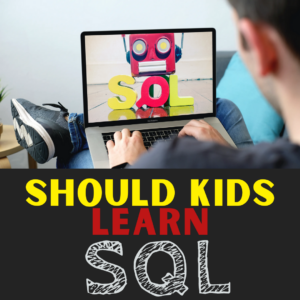I get a lot of interest from high school teachers about teaching databases. These digital tools allow users to query vast amounts of information based on specific areas of interest. They are one of the most effective ways to apply higher order thinking to the world around us.
There are simple ways to teach these in an introductory format for youngers, but by HS, kids should be learning methods that prepare them for college and career. One of those strategies is SQL. What is SQL, you ask? One of our Ask a Tech Teacher contributors explains…
Is It Worth Teaching School Kids SQL?
Today it is widely accepted that teaching kids to code is a great idea, even if they do not aspire to work in areas that will specifically require this skill.
Of course it is all well and good seeing coding as a pastime worth pursuing, but there are lots of different programming languages out there, and not all are ideal for newcomers.
SQL, or structured query language, is one such programming language, so should you consider teaching it to school kids rather than focusing on one of the other options?
Introducing SQL
What makes SQL different from other programming languages is that it serves a specific purpose, rather than being effectively capable of creating almost anything. That purpose is to provide a way for programmers to interact with databases, sorting, organizing and manipulating the information contained within them in a variety of ways.
Like many of the other languages used in coding, SQL has a fairly extensive history, having originally been developed almost half a century ago. Because of this, there are a huge amount of learning resources out there, covering everything from the formulation of the language itself to the SQL server architecture that results from its effective use.
Why SQL matters
First and foremost, SQL is a relevant programming language for people of all ages because of how important data has become in the past couple of decades.
Information is being churned out in greater volumes than ever before, and SQL gives us a better way of working out how to wrangle the seemingly endless amounts of data that result from even the smallest digital interactions.
SQL is used in all sorts of databases, covering everything from the backends of big websites to multimedia services like Spotify. If deployed correctly, it can be incredibly quick and efficient in the way it handles large volumes of information, and is also scalable and flexible, adapting to the changing needs of those that harness it.
The significance of accessibility
From the perspective of teaching school kids to code, SQL has the upper hand over many of its counterparts in that the syntax involved is comparatively straightforward, relying on common English words and phrases to formulate queries which can be interpreted logically both by human users and by database systems which rely on it.
In this sense it is somewhat similar to HTML, another programming language which is often presented as an accessible path into the wider world of coding for youngsters. It could be argued that SQL has an even shallower learning curve than HTML, although the fact that the latter can display the results of the coder’s efforts visually does help to redress the balance to a certain extent.
SQL can appeal to the desire that most children express to build and create things, albeit focusing on the backend aspect of programming rather than the user-facing elements. However, this is definitely beneficial in teaching them about the duality of software, showing that there is much more to the average service than the surface interface elements.
The future applications
By now it should be clear that SQL is a programming language that can benefit code-enthused kids that are taught it effectively in the short term, but there are also lots of long term advantages that it brings to the table.
From a purely practical perspective, having an understanding of SQL will set children up to potentially follow a career path into any number of programming roles, since there is a lot of demand for software engineers with knowledge of SQL. Obviously they will need to continue learning and developing their abilities throughout their academic studies, but instilling them with the basics early on will put them ahead of their peers.
More generally, being familiar with SQL and the means by which databases are orchestrated will give children an appreciation for the ways that all sorts of information is handled today, while also developing skills that will help them in everything from mathematics and science to English comprehension and communication.
Of course teaching coding does not have to be an all-or-nothing process, so factoring in SQL alongside the study of other languages is probably best.
Jacqui Murray has been teaching K-18 technology for 30 years. She is the editor/author of over a hundred tech ed resources including a K-12 technology curriculum, K-8 keyboard curriculum, K-8 Digital Citizenship curriculum. She is an adjunct professor in tech ed, Master Teacher, webmaster for four blogs, an Amazon Vine Voice, CSTA presentation reviewer, freelance journalist on tech ed topics, contributor to NEA Today, and author of the tech thrillers, To Hunt a Sub and Twenty-four Days. You can find her resources at Structured Learning.






































So much that teachers would need to know first to teach it.
I do get request for database lesson plans. I don’t teach SQL or even Access (though I tried to learn it) so tend to concentrate more on pre-database strategies.
You know so much about tech. 🙂
I liked the words. Hope we follow each other.
I’ll check out your blog. Thanks for visiting.